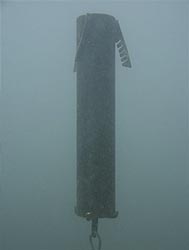| Protecting Malawi cichlidsby
Ad Konings / continued part 6—
Most of these contraptions were made and placed by Alan who has also started to plant the bare sandy areas with aquatic plants from parts of the island where they were still present. I remember that one particular corner along the eastside of the large island was heavily vegetated 20 years ago (underwater). All these plants have since been torn out by seine nets. Now they are slowly replaced by transplants from the surrounding areas. Illegal fishing is sometimes still a problem but these are with short static nets placed at risk between the artificial reefs. These aquatic plants play a very important role in the lives of many utaka as they serve as nursery grounds giving protection and food to the small fry. The local fishermen, who are allowed to fish beyond the 100 meter boundary of the Park, commented recently that there seems to be more fish around the islands. Also the tour operators of Danforth Yachting commented that the rock-dwelling cichlid populations around the Maleri islands are in a much better shape than those at Cape Maclear and they now prefer to bring their guests to the Maleris for snorkeling and/or diving excursions. |
 If
funds become available the men from Waterlands are willing to place net
barriers all around the shoreline of the National Park for which they have
been given permission from the parks director Dr. Leonard Sefu. Jay Stauffer
of Penn State University and I are planning to generate funding for the
ongoing protection of Malawi cichlids via donations into the “Stuart M.
Grant Cichlid Conservation Fund”. These donations are tax-deductible when
you make your check out to Penn State University and mail it to Prof. Jay
R Stauffer, 420 Forest Resources Building, Penn State University, University
Park, PA 16802 (write Stuart Grant Fund in the "memo..." area of your check).
You will get a statement in return that you can use for tax purposes. You
can also donate any amount via Paypal using the link on this page but since
this goes to Cichlid Press we can only have a letter sent from Pennstate
for your tax-deduction when the donation is over $25. If
funds become available the men from Waterlands are willing to place net
barriers all around the shoreline of the National Park for which they have
been given permission from the parks director Dr. Leonard Sefu. Jay Stauffer
of Penn State University and I are planning to generate funding for the
ongoing protection of Malawi cichlids via donations into the “Stuart M.
Grant Cichlid Conservation Fund”. These donations are tax-deductible when
you make your check out to Penn State University and mail it to Prof. Jay
R Stauffer, 420 Forest Resources Building, Penn State University, University
Park, PA 16802 (write Stuart Grant Fund in the "memo..." area of your check).
You will get a statement in return that you can use for tax purposes. You
can also donate any amount via Paypal using the link on this page but since
this goes to Cichlid Press we can only have a letter sent from Pennstate
for your tax-deduction when the donation is over $25.
|
